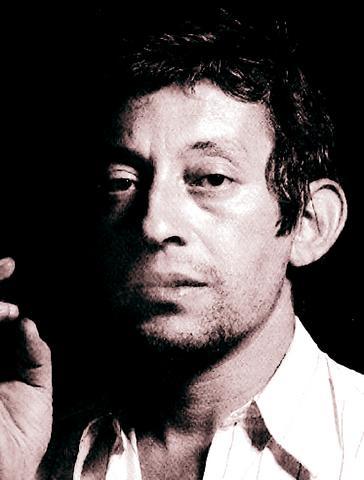France is a country that loves its cultural icons and national heroes, even when they're lecherous, foul-mouthed boors like Serge Gainsbourg -- or, especially when they're lecherous, foul-mouthed boors like Serge Gainsbourg.
The man who started out in the 1950s as an obscure bar pianist singing gritty tunes inspired by Boris Vian grew in stature throughout his life, never really fading from view and always interjecting into the public debate at key moments to deflate someone's ego or otherwise shock people with a dose of poignant, wry commentary ... or great music. And for this, Gainsbourg is revered in his country as something akin to a god.

PHOTO COUTRESY OF UNIVERSAL MUSIC
So, for anyone in Taipei who wants to pay their respects or see what all the fuss is about, Nowhere cafe tonight will be hosting a special tribute to Gainsbourg's life and his music, TV and film work.

PHOTO COUTRESY OF UNIVERSAL MUSIC
When asked "why Gainsbourg and why now," Alex Liu (
Indeed, Gainsbourg, even in his later years, embodied French coolness and the best part about him was that he didn't care, or made a convincing show of not caring. He had seen too much, having survived as a Jew in Vichy France, to be swept away by mania.

PHOTO COUTRESY OF UNIVERSAL MUSIC
Gainsbourg started out by playing in the dingy bars of Pigalle until he landed a gig in 1959 at the legendary jazz club Milord Arsouille and caught the eye of Vian, whose songs he had emulated. Perhaps seeing himself in Gainsbourg, Vian raved about his shows and before long Gainsbourg was recording his first tracks and getting dismal reviews from major publications -- a sure sign of budding greatness.
He began to gain his due credit in the early 1960s when he wrote songs for France Gall and when he finally hooked up with Brigitte Bardot in 1967 and released one of his most famous songs, Bonnie and Clyde, the following year (sampled decades later by MC Solar). That same year he recorded his most famous song with Bardot, Je t'aime (moi non plus) (I Love You No More), but when she refused to have it released, fearing the scandal that she correctly predicted it would cause, Gainsbourg re-recorded the track with Jane Birkin.
When the song was released in 1969, several countries, including the Vatican, immediately banned its sale and a hero for the "Paris 68" generation was born in Gainsbourg.
Having set the tone for the coming decade with Je t'aime a moi non plus, Gainsbourg reveled in the annees erotiques (erotic years), feeding off the raw sexual energy of the collaboration with Birkin to make some of his best recordings and his first film in 1975 titled Je t'aime (moi non plus), which will be played at tonight's tribute party. By the end of the decade, Gainsbourg was experimenting with reggae and came out with one of his most beloved songs, Vieille Canaille (Old Hag), which was brilliant in its lyrical simplicity: "I'll be glad when you're dead, old hag" goes the opening verse.
Through the 1980s Gainsbourg shifted some of his attention to his daughter Charlotte -- now a well-known actress -- and caused scandal again with a duet sung with her titled Lemon Incest. The video to the song will also be played at tonight's show and even in these jaded times it's hard to watch without feeling a tad uncomfortable at the closeness of the father-daughter pair.
It was also at the time of Lemon Incest that Gainsbourg made a mortal enemy of Whitney Houston on live TV in France. With his characteristic lack of propriety and in his gravelly, cigarette-damaged voice he gazed sleepily over at Houston on the set of a popular Sunday night variety show and said, in the casual manner that one comments on the weather, "I want to fuck you." This didn't sit well with Houston, who flew into a rage, but everyone watching at home, chuckled. And no one, at least not in France, was going to make any apologies for Gainsbourg either, because everyone expected no less from him. In fact, Gainsbourg was at his best when he was at his most churlish. And he regularly outdid himself in that arena.
That irreverent spirit should be revived tonight in the movie and TV clips. Randy Lin (
Tonight's event is the second Lap Dance party, which was originally conceived as an assembly of experimental laptop musicians, but seems to have branched into theme nights like tonight's Gainsbourg tribute. The next Lap Dance will take place Jan. 1 at the Underworld on Shida Road and will be a tribute to Manu Chao and to his early band, Mano Negra.
What: Jeux Interdits: A Tribute to Serge Gainsbourg.
When: Tonight, 10pm.
Where: Nowhere, 1, Ln 60, Xinsheng S Rd, Sec 3, Taipei
(
Tickets: NT$300 at the door, including a drink.

May 18 to May 24 Pastor Yang Hsu’s (楊煦) congregation was shocked upon seeing the land he chose to build his orphanage. It was surrounded by mountains on three sides, and the only way to access it was to cross a river by foot. The soil was poor due to runoff, and large rocks strewn across the plot prevented much from growing. In addition, there was no running water or electricity. But it was all Yang could afford. He and his Indigenous Atayal wife Lin Feng-ying (林鳳英) had already been caring for 24 orphans in their home, and they were in

President William Lai (賴清德) yesterday delivered an address marking the first anniversary of his presidency. In the speech, Lai affirmed Taiwan’s global role in technology, trade and security. He announced economic and national security initiatives, and emphasized democratic values and cross-party cooperation. The following is the full text of his speech: Yesterday, outside of Beida Elementary School in New Taipei City’s Sanxia District (三峽), there was a major traffic accident that, sadly, claimed several lives and resulted in multiple injuries. The Executive Yuan immediately formed a task force, and last night I personally visited the victims in hospital. Central government agencies and the

Australia’s ABC last week published a piece on the recall campaign. The article emphasized the divisions in Taiwanese society and blamed the recall for worsening them. It quotes a supporter of the Taiwan People’s Party (TPP) as saying “I’m 43 years old, born and raised here, and I’ve never seen the country this divided in my entire life.” Apparently, as an adult, she slept through the post-election violence in 2000 and 2004 by the Chinese Nationalist Party (KMT), the veiled coup threats by the military when Chen Shui-bian (陳水扁) became president, the 2006 Red Shirt protests against him ginned up by

As with most of northern Thailand’s Chinese Nationalist Party (KMT) settlements, the village of Arunothai was only given a Thai name once the Thai government began in the 1970s to assert control over the border region and initiate a decades-long process of political integration. The village’s original name, bestowed by its Yunnanese founders when they first settled the valley in the late 1960s, was a Chinese name, Dagudi (大谷地), which literally translates as “a place for threshing rice.” At that time, these village founders did not know how permanent their settlement would be. Most of Arunothai’s first generation were soldiers